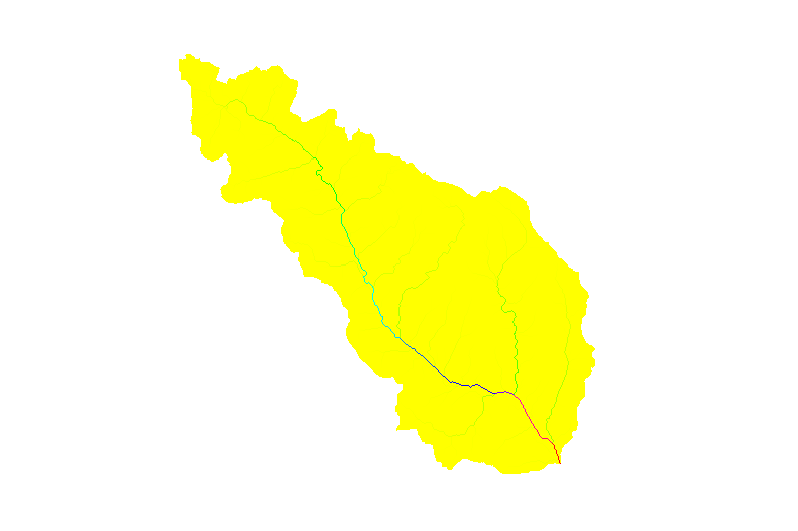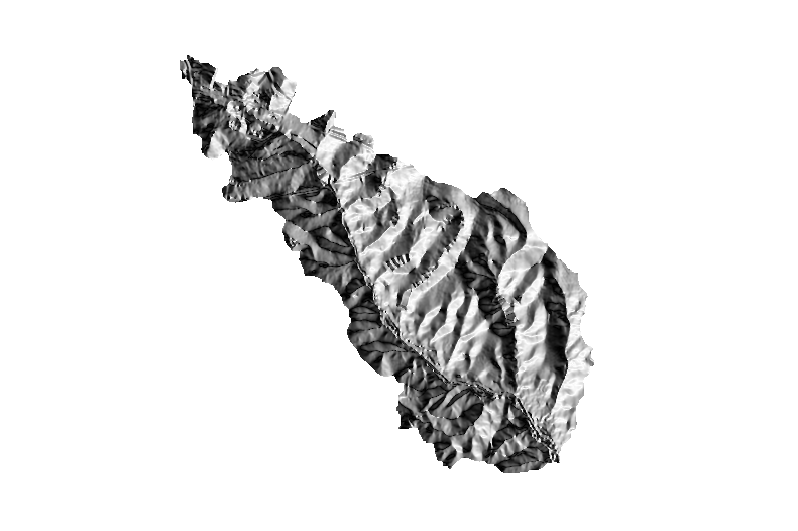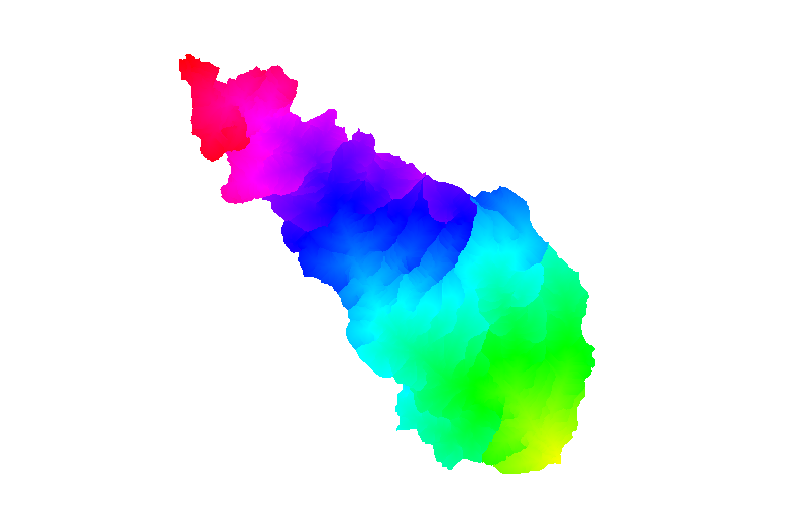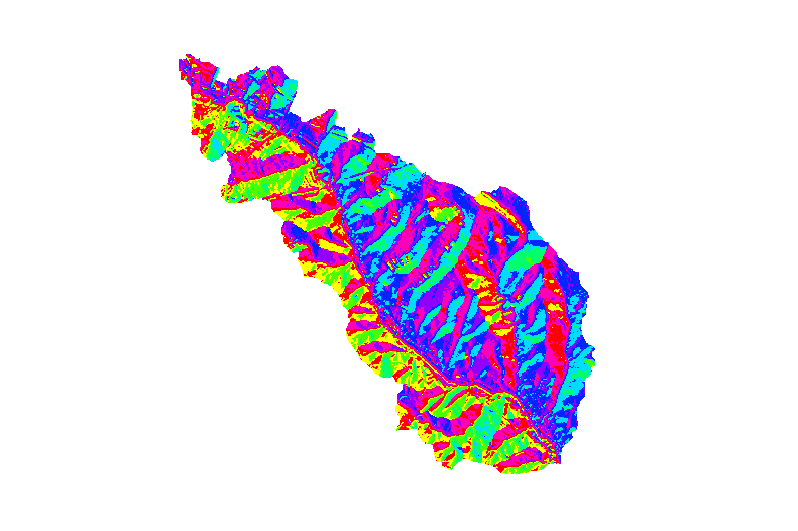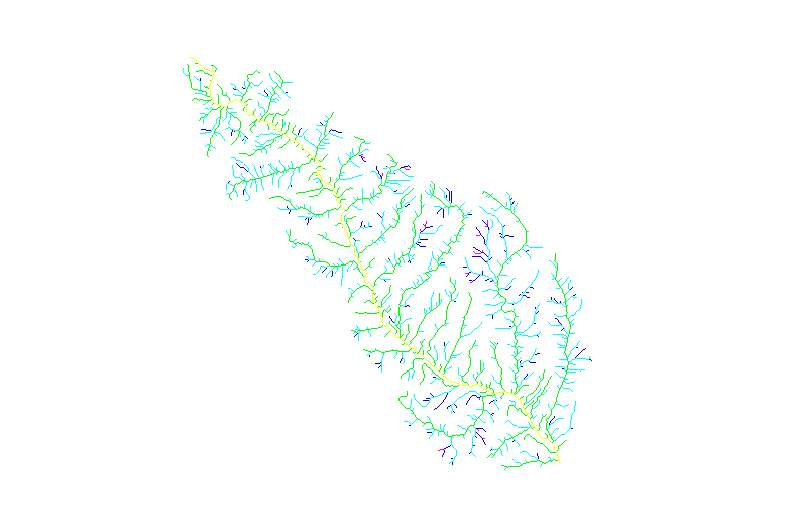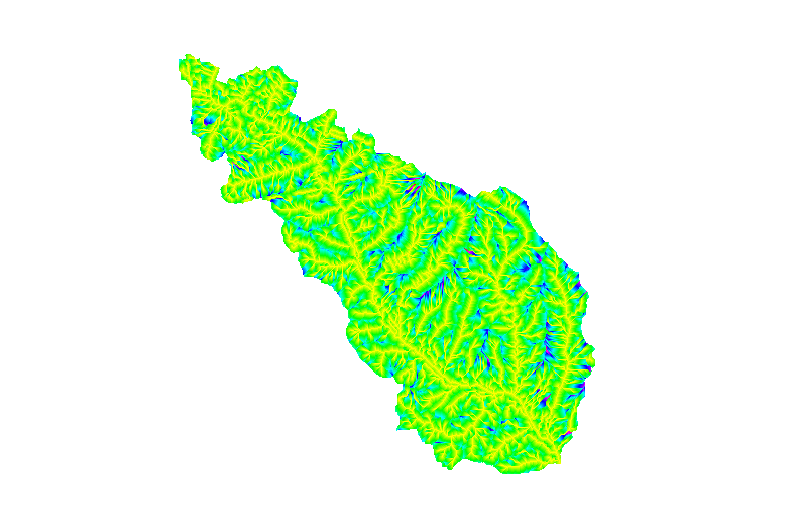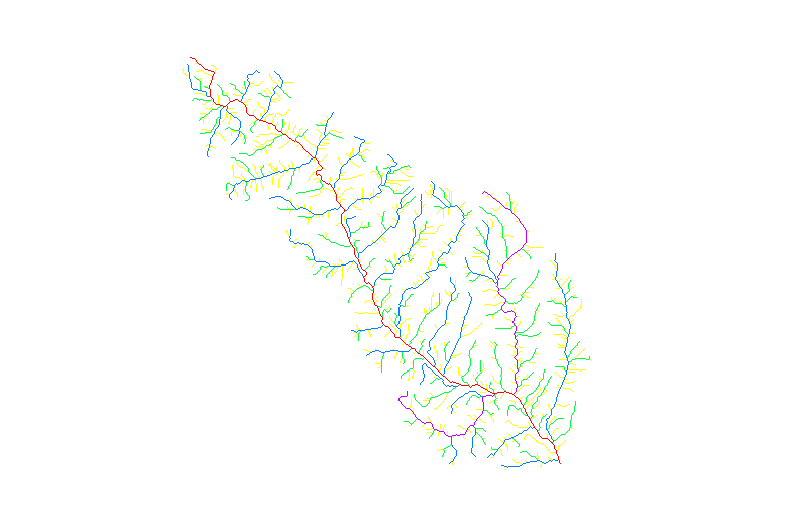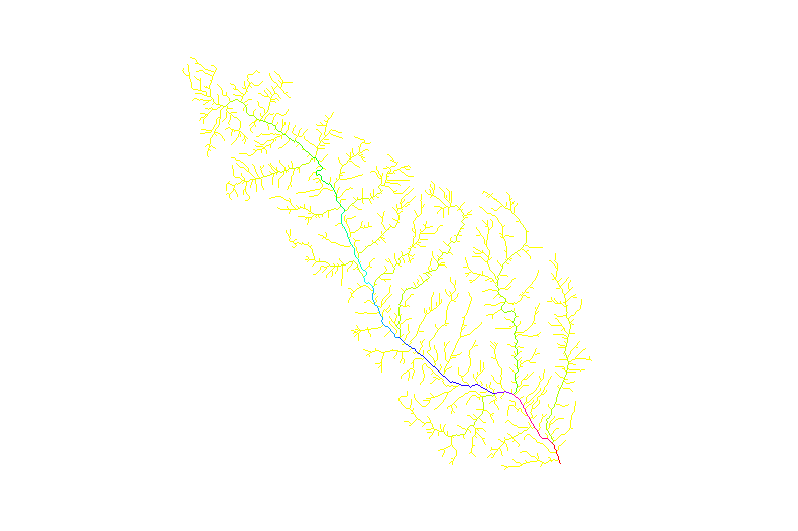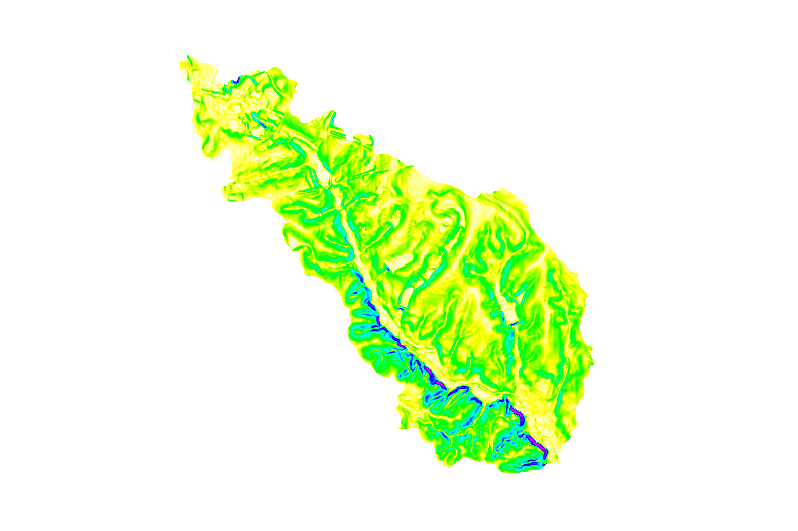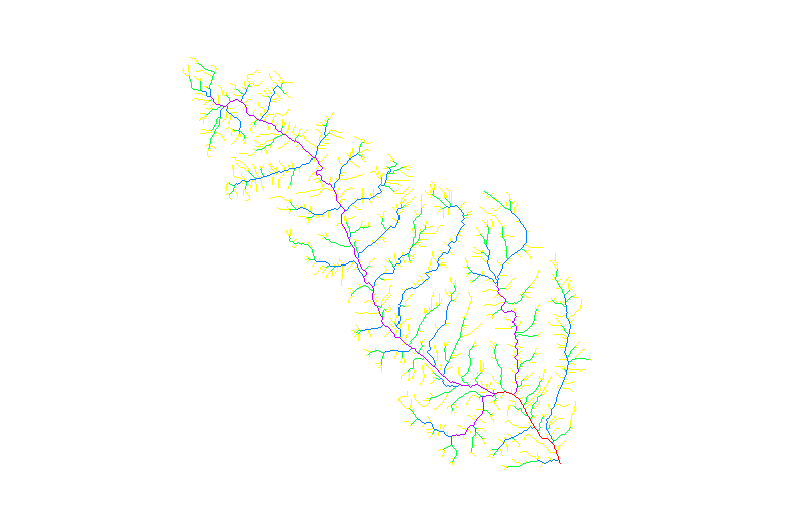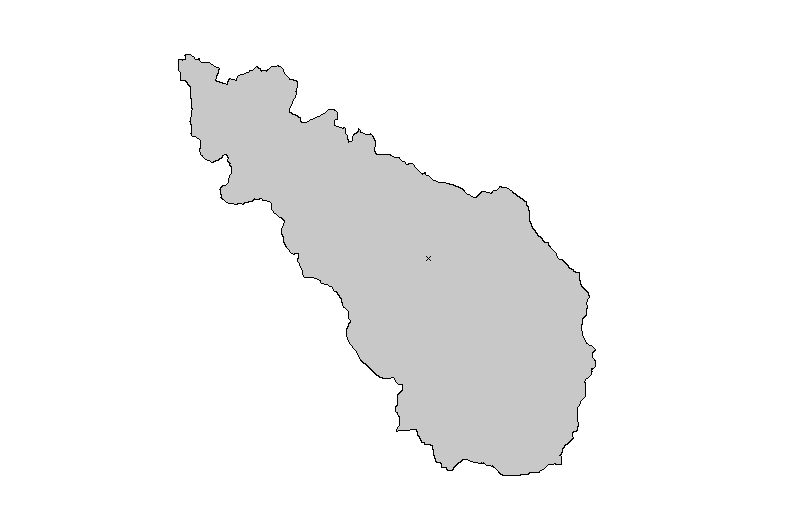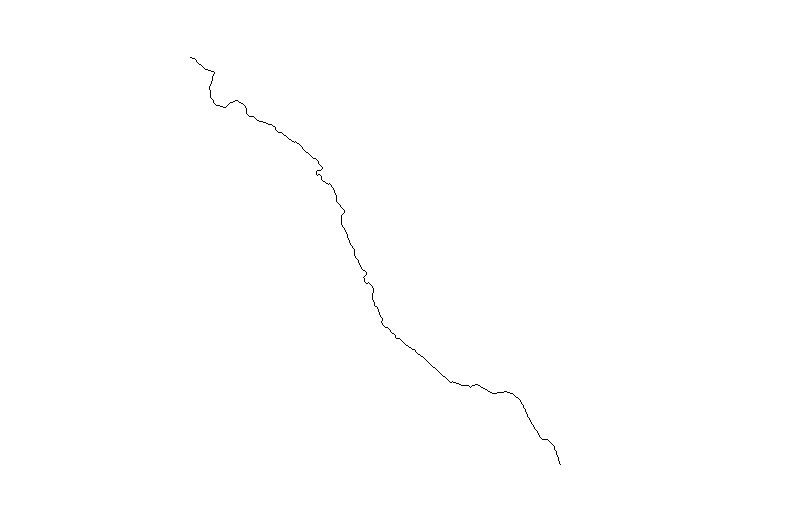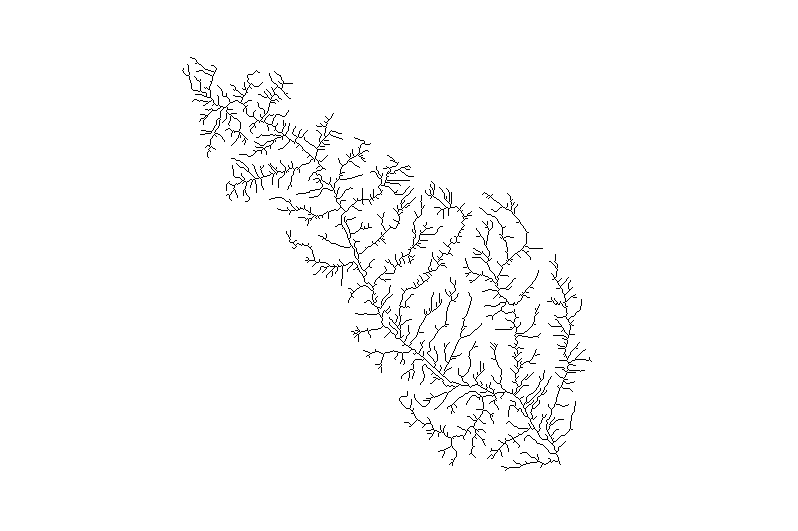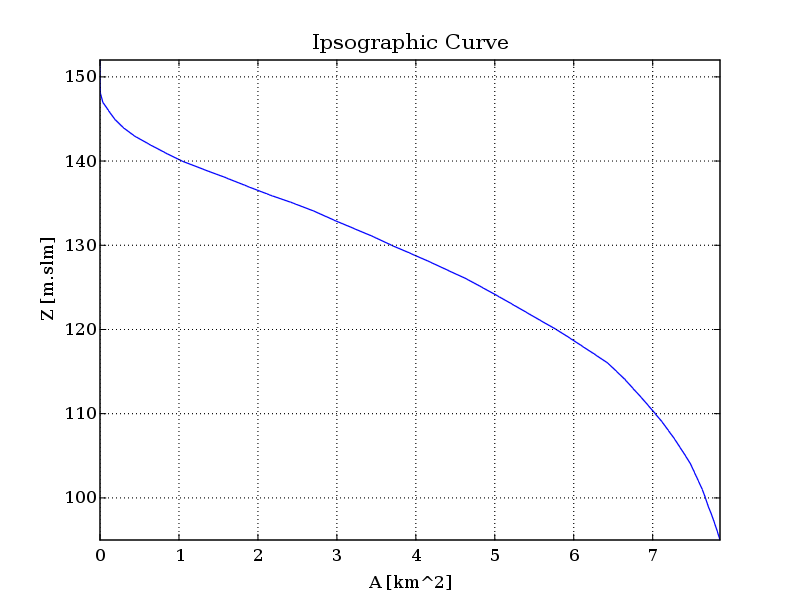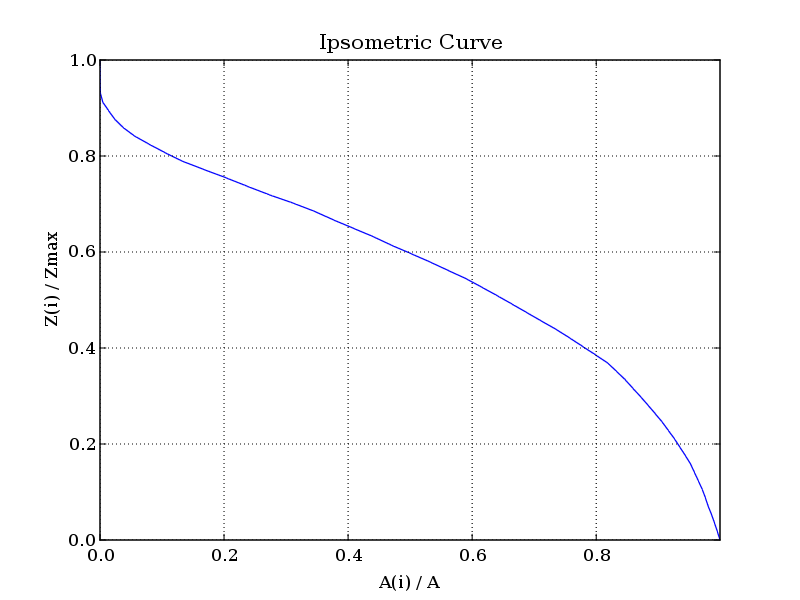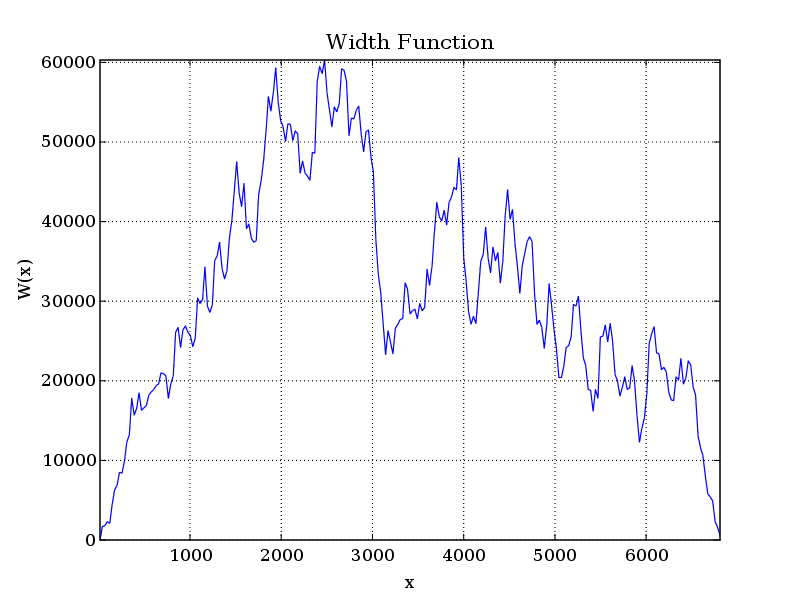R.basin
Introduction
The module r.basin has been designed to perform the delineation and the morphometric characterization of a given basin, on the basis of an elevation raster map and the coordinates of the outlet. Please note that it is designed to work only in projected coordinates. Here a tutorial based on NC sample dataset is presented.
Preparation
As a first step, we set the computational region to match the elevation raster map:
g.region rast=elevation@PERMANENT -ap projection: 99 (Lambert Conformal Conic) zone: 0 datum: nad83 ellipsoid: a=6378137 es=0.006694380022900787 north: 228500 south: 215000 west: 630000 east: 645000 nsres: 10 ewres: 10 rows: 1350 cols: 1500 cells: 2025000
For the basin's delineation, a pair of coordinates is required. Usually coordinates belonging to the natural river network don't exactly match with the calculated stream network. What we should do is calculating the stream network first, and then find the coordinates on the calculated stream network closest to the coordinates belonging to the natural stream network.
# Calculate flow accumulation map r.watershed -a elevation=elevation@PERMANENT accumulation=accum # Extract the stream network r.stream.extract elevation=elevation@PERMANENT accumulation=accum@testing threshold=20 stream_rast=stream_network
We no longer need the accumulation map:
g.remove rast=accum
Now that we have the calculated stream network, we should choose a pair of coordinates for the outlet belonging to it. Let's choose:
easting=636654.791181 northing=218824.126649
We no longer need the stream network map:
g.remove rast=stream_network
Usage
We can run r.basin:
r.basin map=elevation@PERMANENT prefix=out easting=636654.791181 northing=218824.126649 threshold=20
Prefix parameter is a string given by the user in order to distinguish all the maps produced by every run of the program, i.e. every set of outlet's coordinates. Prefix must start with a letter.
Threshold is the same parameter given in r.watershed and r.stream.extract. Physically, it means the number of cells that determine "where the river begins". (This is an open issue for the hydrological science and a wide literature has been produced on the topic). In order to determine the threshold, see also r.threshold and r.stream.preview.
The output of r.basin consists of:
- Several morphometric parameters, which are printed in terminal and also stored in a csv file called out_elevation_parameters.csv, in the working directory;
- Maps;
- Plots.
Morphometric parameters
The main parameters are:
- The coordinates of the vertices of the rectangle containing the basin.
- The center of gravity of the basin: the coordinates of the pixel nearest to the center of gravity of the geometric figure resulting from the projection of the basin on the horizontal plane.
- The area of the basin: is the area of a single cell multiplied by the number of cells belonging to the basin.
- The perimeter: is the length of the contour of the figure resulting by the projection of the basin on the horizontal plane.
[As a side note, a paper namely "How Long Is the Coast of Britain? Statistical Self-Similarity and Fractional Dimension" points out that perimeter is affected by a fractal problem and the number is mostly meaningless taken by itself. Hence, perimeter should never be mixed with anything from another dataset or even the same data set at a different cell resolution; it is only good as a percentage comparison to its neighbors in the same dataset].
- Characteristic values of elevation: the highest and the lowest altitude, the difference between them and the mean elevation calculated as the sum of the values of the cells divided by the number of the cells.
- The mean slope, calculated averaging the slope map.
- The length of the directing vector: the length of the vector linking the outlet to the center of gravity of the basin.
- The prevalent orientation: in GRASS the aspect categories represent the number degrees of east and they increase counterclockwise: (90deg is North, 180 is West, 270 is South 360 is East). The aspect value 0 is used to indicate undefined aspect in flat areas with slope=0. We instead calculate the orientation as the number of degree from north, increasing counterclockwise.
- The length of main channel: is the length of the longest succession of segments that connect a source to the outlet of the basin.
The mean slope of main channel: it is calculated as follows:
where N is the topological diameter, i.e. the number of links in which the main channel can be divided on the basis of the junctions.
- The circularity ratio: is the ratio between the area of the basin and the area of the circle having the same perimeter of the basin.
- The elongation ratio: is the ratio between the diameter of the circle having the same area of the basin and the length of the main channel.
- The compactness coefficient: is the ratio between the perimeter of the basin and the diameter of the circle having the same area of the basin.
- The shape factor: is the ratio between the area of the basin and the square of the length of the main channel.
- The concentration time (Giandotti, 1934):
Where A is the area, L the length of the main channel and H the difference between the highest and the lowest elevation of the basin.
- The mean hillslope length: is the mean of the distances calculated along the flow direction of each point non belonging to the river network from the point in which flows into the network.
- The magnitudo: is the number of the branches of order 1 following the Strahler hierarchy.
- The max order: is the order of the basin, following the Strahler hierarchy.
- The number of streams: is the number of the branches of the river network.
- The total stream length: is the sum of the length of every branches.
- The first order stream frequency: is the ratio between the magnitudo and the area of the basin.
- The drainage density: is the ratio between the total length of the river network and the area.
- The Horton ratios (Horton, 1945; Strahler, 1957).
################################## Morphometric parameters of basin : ################################## Easting Centroid of basin : 635195.00 Northing Centroid of Basin : 220715.00 Rectangle containing basin N-W : 632870 , 222890 Rectangle containing basin S-E : 637000 , 218720 Area of basin [km^2] : 7.8559625 Perimeter of basin [km] : 16.8287990515 Max Elevation [m s.l.m.] : 151.7396 Min Elevation [m s.l.m.]: 94.82206 Elevation Difference [m]: 56.91754 Mean Elevation [m s.l.m.]: 127.6772 Mean Slope : 2.93 Length of Directing Vector [km] : 2.38880562659 Prevalent Orientation [degree from north, counterclockwise] : 0.913351005341 Compactness Coefficient : 5.32106255399 Circularity Ratio : 0.348580442132 Topological Diameter : 127.0 Elongation Ratio : 0.470961456397 Shape Factor : 1.16984953656 Concentration Time (Giandotti, 1934) [hr] : 3.52654267443 Length of Mainchannel [km] : 6.715361467 Mean slope of mainchannel [percent] : 0.957339 Mean hillslope length [m] : 8145.381 Magnitudo : 621.0 Max order (Strahler) : 5 Number of streams : 884 Total Stream Length [km] : 96.3436 First order stream frequency : 79.0482388377 Drainage Density [km/km^2] : 12.2637550778 Bifurcation Ratio (Horton) : 5.7374 Length Ratio (Horton) : 2.6902 Area ratio (Horton) : 5.6815 Slope ratio (Horton): 1.5533
The hypsographic curve provides the distribution of the areas at different altitudes. Each point on the hypsographic curve has on the y-axis the altitude and on the x-axis the percentage of basin surface placed above that altitude. The ipsometric curve has the same shape but is dimensionless. Quantiles of the ipsometric curve are displayed:
Tot. cells 78560.0 =========================== Ipsometric | quantiles =========================== 145 | 0.025 143 | 0.05 141 | 0.1 137 | 0.25 129 | 0.5 119 | 0.75 121 | 0.7 110 | 0.9 100 | 0.975
The width function W(x) gives the area of the cells in the basin at a certain flow distance x from the outlet (distance-area function). Note that the distance is not intended in the euclidean sense, but it's calculated considering the hydrological path of the water.
Tot. cells 78560.0 Tot. area 7856000.0 Max distance 6809.546521 =========================== Whidth Function | quantiles =========================== 784 | 0.05 1477 | 0.15 2137 | 0.3 2543 | 0.4 2933 | 0.5 3606 | 0.6 4169 | 0.7 5144 | 0.85 6105 | 0.95
The output of r.stream.stats is also displayed:
Summary:
Max order | Tot.N.str. | Tot.str.len. | Tot.area. | Dr.dens. | Str.freq.
(num) | (num) | (km) | (km2) | (km/km2) | (num/km2)
5 | 884 | 96.3436 | 7.8339 | 12.2983 | 112.8429
Stream ratios with standard deviations:
Bif.rt. | Len.rt. | Area.rt. | Slo.rt. | Grd.rt.
5.7374 | 2.6902 | 5.6815 | 1.5533 | 1.7962
3.1961 | 1.9514 | 5.2294 | 0.1250 | 0.7482
Order | Avg.len | Avg.ar | Avg.sl | Avg.grad. | Avg.el.dif
num | (km) | (km2) | (m/m) | (m/m) | (m)
1 | 0.0750 | 0.0069 | 0.0523 | 0.0384 | 3.1062
2 | 0.1428 | 0.0311 | 0.0342 | 0.0277 | 4.1701
3 | 0.4834 | 0.1732 | 0.0243 | 0.0205 | 9.0641
4 | 2.4205 | 2.1885 | 0.0155 | 0.0134 | 24.1708
5 | 1.1247 | 7.8339 | 0.0091 | 0.0046 | 5.1594
Order | Std.len | Std.ar | Std.sl | Std.grad. | Std.el.dif
num | (km) | (km2) | (m/m) | (m/m) | (m)
1 | 0.0600 | 0.0052 | 0.0398 | 0.0287 | 3.2301
2 | 0.1244 | 0.0230 | 0.0250 | 0.0196 | 4.4835
3 | 0.4554 | 0.1353 | 0.0132 | 0.0122 | 7.1065
4 | 2.2874 | 2.3843 | 0.0046 | 0.0061 | 12.9175
5 | 0.0000 | 0.0000 | 0.0000 | 0.0000 | 0.0000
Order | N.streams | Tot.len (km) | Tot.area (km2)
1 | 712 | 53.4067 | 4.8998
2 | 137 | 19.5657 | 4.2562
3 | 31 | 14.9849 | 5.3684
4 | 3 | 7.2616 | 6.5655
5 | 1 | 1.1247 | 7.8339
Order | Bif.rt. | Len.rt. | Area.rt. | Slo.rt. | Grd.rt. | d.dens. | str.freq.
1 | 5.1971 | 1.9040 | 0.0000 | 1.5311 | 1.3892 | 10.8998 | 145.3120
2 | 4.4194 | 3.3847 | 4.5144 | 1.4046 | 1.3472 | 4.5970 | 32.1883
3 | 10.3333 | 5.0075 | 5.5742 | 1.5691 | 1.5365 | 2.7913 | 5.7745
4 | 3.0000 | 0.4646 | 12.6376 | 1.7083 | 2.9120 | 1.1060 | 0.4569
5 | 0.0000 | 0.0000 | 3.5796 | 0.0000 | 0.0000 | 0.1436 | 0.1277
Maps
Since r.basin performs the delimitation of the river basin, all the maps produced are cropped over the basin. They are:
- Raster maps
g.list rast out_elevation_accumulation out_elevation_hillslope_distance out_elevation_aspect out_elevation_horton out_elevation_dist2out out_elevation_shreve out_elevation_drainage out_elevation_slope out_elevation_hack out_elevation_strahler
-
Flow accumulation
-
Aspect
-
Distance to outlet (width function)
-
Flow direction
-
Stream network ordered according to Hack
-
Length of hillslopes
-
Stream network ordered according to Horton
-
Stream network ordered according to Shreve
-
Slope
-
Stream network ordered according to Strahler
- Vector maps
g.list vect out_elevation_basin out_elevation_network out_elevation_mainchannel out_elevation_outlet
-
Basin
-
Main channel
-
Stream network
-
Outlet
Plots
Plots are stored in the working directory:
- out_elevation_ipsographic.png
- out_elevation_ipsometric.png
- out_elevation_width_function.png
-
Ipsographic curve
-
Ipsometric curve (Nondimensional ipsographic curve)
-
Width function
See also
References
- Rodriguez-Iturbe I., Rinaldo A.; Fractal River Basins, Chance and Self-Organization. Cambridge Press (2001)
- Di Leo M., Di Stefano M., Claps P., Sole A. Caratterizzazione morfometrica del bacino idrografico in GRASS GIS (Morphometric characterization of the catchment in GRASS GIS environment), Geomatics Workbooks n.9, 2010. (PDF).


